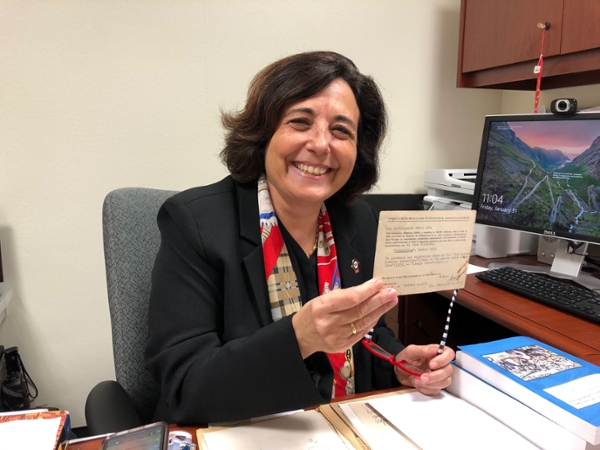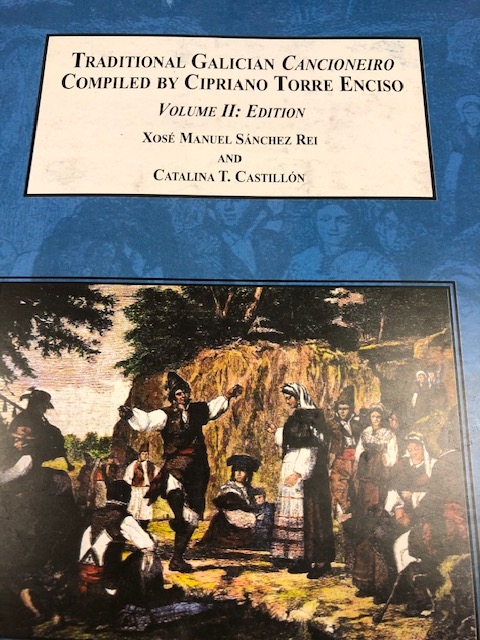Castillon recognized for significance in preserving the culture of Galicia, Spain
Lamar University Professor of Spanish and Director of Modern Languages, Catalina Castillón, has been  recognized as one of eight women significant to preserving the culture of Spain. The distinction, published in the “Mundiario,” a global online periodical, acknowledged Castillón for her leadership role in publishing, “Traditional Galician Cancioneiro.”
recognized as one of eight women significant to preserving the culture of Spain. The distinction, published in the “Mundiario,” a global online periodical, acknowledged Castillón for her leadership role in publishing, “Traditional Galician Cancioneiro.”
“Traditional Galician Cancioneiro” is a compilation of more than 7,000 poems in Gallego language that Castillon’s maternal grandfather, Cipriano Torre Enciso, collected during his lifetime. Torre Enciso was a lawyer and journalist and one of the founders of the national radio in Spain but more than anything he loved his homeland, Galicia, located in the northwest Iberian Peninsula, and wanted to preserve its culture and language.
“When my grandfather died in 1994, I inherited popular poems and songs he collected in Gallego language at different places such as fairs and social gatherings, at the markets, and from antique books,” said Castillón. “They are completely anonymous and are what the Galicians sing at their parties, celebrations, folkloric traditional events, at Christmas time. Some of them are dedicated to professions - millworkers, seamstresses, etc. Other are love songs, or dedicated to the sea, the land, food. Some of the poems are quite humorous, while other have deep philosophical meanings. It could be said that there is a “copla” or popular poem for each life experience, and they all represent the folklore and culture of the land and the people.”
 Upon discovery of the works – more than a thousand typed pages on onion-skin paper and separated into 20 different folders – she thought the collection might be important and felt a responsibility to her grandfather to find out.
Upon discovery of the works – more than a thousand typed pages on onion-skin paper and separated into 20 different folders – she thought the collection might be important and felt a responsibility to her grandfather to find out.
In 2014, Castillón took developmental leave from Lamar University to work on the possible “treasure.” She typed every piece of the collection creating a digital file and contacted university presidents in Spain to ascertain an interest. She also secured a publisher for the works, Mellen Press.
Through her networking, Castillón met Xosé Manuel Sánchez Rei, a senior lecturer in Galician and Portuguese studies at the University of A Coruña. “I sent him the typed pages and said, ‘see what you think,’” said Castillón. “He called and wanted to meet. He had printed all of the pages out and said, ‘I need to tell you this is the best 20th century compilation I have ever seen.’”
“He is the primary author, because this is his area of expertise,” said Castillón. “He truly is the one who put his heart and soul into the linguistic and philological parts of the book.”
Castillón wrote the initial chapters of the book giving a historical perspective as well as an introductory literary analysis, providing the English translation of many exemplary poems, and telling the story of her grandfather and the book’s journey from discovery to completion.
Castillón believes her grandfather’s mission to preserve and celebrate the culture of Galicia and her mission to help others learn language and cultures collide in the finished “labor of love.”
“He wanted to preserve the culture and language of Galicia,” said Castillón. “I continue his mission by teaching the literature, culture, history of all of the Spanish (and Galician) speaking countries and believe that learning a language makes you smarter in your own language and culture and is a way to learn about other worlds, other countries, other minds, other peoples and that makes you competent and ready no matter what career you pursue.”


